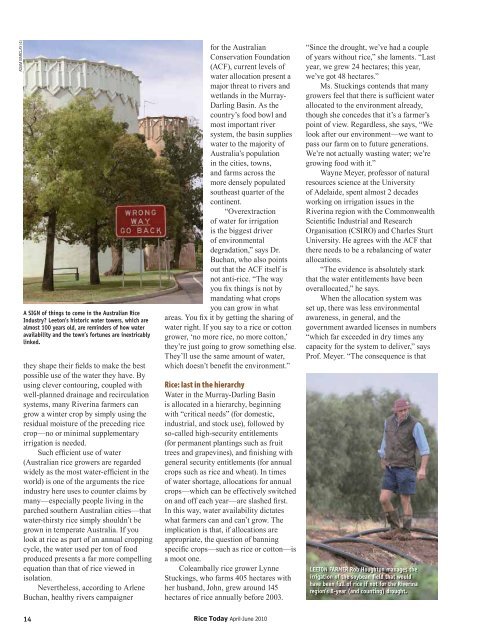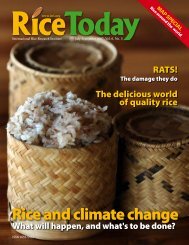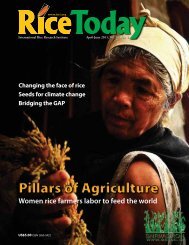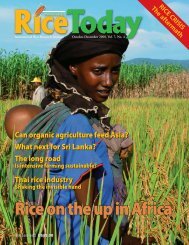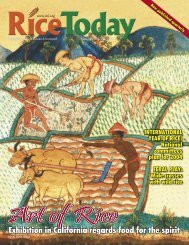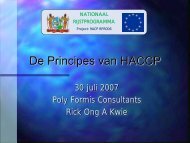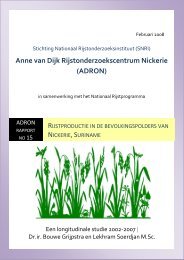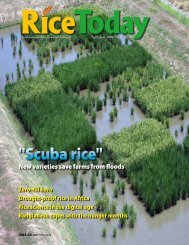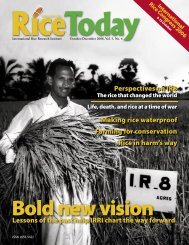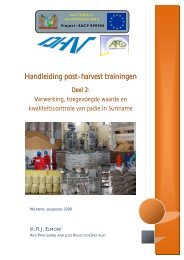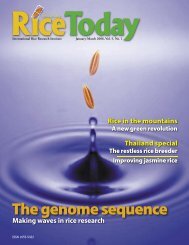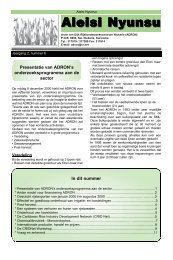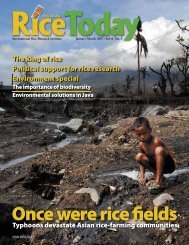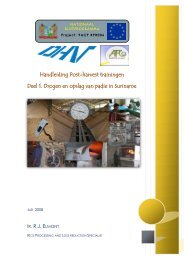A sunburned grain Stamps of approval Pockets of gold in ... - adron.sr
A sunburned grain Stamps of approval Pockets of gold in ... - adron.sr
A sunburned grain Stamps of approval Pockets of gold in ... - adron.sr
You also want an ePaper? Increase the reach of your titles
YUMPU automatically turns print PDFs into web optimized ePapers that Google loves.
ADAM BARCLAY (4)A SIGN <strong>of</strong> th<strong>in</strong>gs to come <strong>in</strong> the Australian RiceIndustry? Leeton’s historic water towers, which arealmost 100 years old, are rem<strong>in</strong>ders <strong>of</strong> how wateravailability and the town’s fortunes are <strong>in</strong>extricablyl<strong>in</strong>ked.they shape their fields to make the bestpossible use <strong>of</strong> the water they have. Byus<strong>in</strong>g clever contour<strong>in</strong>g, coupled withwell-planned dra<strong>in</strong>age and recirculationsystems, many River<strong>in</strong>a farmers cangrow a w<strong>in</strong>ter crop by simply us<strong>in</strong>g theresidual moisture <strong>of</strong> the preced<strong>in</strong>g ricecrop—no or m<strong>in</strong>imal supplementaryirrigation is needed.Such efficient use <strong>of</strong> water(Australian rice growers are regardedwidely as the most water-efficient <strong>in</strong> theworld) is one <strong>of</strong> the arguments the rice<strong>in</strong>dustry here uses to counter claims bymany—especially people liv<strong>in</strong>g <strong>in</strong> theparched southern Australian cities—thatwater-thirsty rice simply shouldn’t begrown <strong>in</strong> temperate Australia. If youlook at rice as part <strong>of</strong> an annual cropp<strong>in</strong>gcycle, the water used per ton <strong>of</strong> foodproduced presents a far more compell<strong>in</strong>gequation than that <strong>of</strong> rice viewed <strong>in</strong>isolation.Nevertheless, accord<strong>in</strong>g to ArleneBuchan, healthy rivers campaignerfor the AustralianConservation Foundation(ACF), current levels <strong>of</strong>water allocation present amajor threat to rivers andwetlands <strong>in</strong> the Murray-Darl<strong>in</strong>g Bas<strong>in</strong>. As thecountry’s food bowl andmost important riversystem, the bas<strong>in</strong> supplieswater to the majority <strong>of</strong>Australia’s population<strong>in</strong> the cities, towns,and farms across themore densely populatedsoutheast quarter <strong>of</strong> thecont<strong>in</strong>ent.“Overextraction<strong>of</strong> water for irrigationis the biggest driver<strong>of</strong> environmentaldegradation,” says Dr.Buchan, who also po<strong>in</strong>tsout that the ACF itself isnot anti-rice. “The wayyou fix th<strong>in</strong>gs is not bymandat<strong>in</strong>g what cropsyou can grow <strong>in</strong> whatareas. You fix it by gett<strong>in</strong>g the shar<strong>in</strong>g <strong>of</strong>water right. If you say to a rice or cottongrower, ‘no more rice, no more cotton,’they’re just go<strong>in</strong>g to grow someth<strong>in</strong>g else.They’ll use the same amount <strong>of</strong> water,which doesn’t benefit the environment.”Rice: last <strong>in</strong> the hierarchyWater <strong>in</strong> the Murray-Darl<strong>in</strong>g Bas<strong>in</strong>is allocated <strong>in</strong> a hierarchy, beg<strong>in</strong>n<strong>in</strong>gwith “critical needs” (for domestic,<strong>in</strong>dustrial, and stock use), followed byso-called high-security entitlements(for permanent plant<strong>in</strong>gs such as fruittrees and grapev<strong>in</strong>es), and f<strong>in</strong>ish<strong>in</strong>g withgeneral security entitlements (for annualcrops such as rice and wheat). In times<strong>of</strong> water shortage, allocations for annualcrops—which can be effectively switchedon and <strong>of</strong>f each year—are slashed first.In this way, water availability dictateswhat farmers can and can’t grow. Theimplication is that, if allocations areappropriate, the question <strong>of</strong> bann<strong>in</strong>gspecific crops—such as rice or cotton—isa moot one.Coleambally rice grower LynneStuck<strong>in</strong>gs, who farms 405 hectares withher husband, John, grew around 145hectares <strong>of</strong> rice annually before 2003.“S<strong>in</strong>ce the drought, we’ve had a couple<strong>of</strong> years without rice,” she laments. “Lastyear, we grew 24 hectares; this year,we’ve got 48 hectares.”Ms. Stuck<strong>in</strong>gs contends that manygrowers feel that there is sufficient waterallocated to the environment already,though she concedes that it’s a farmer’spo<strong>in</strong>t <strong>of</strong> view. Regardless, she says, “Welook after our environment—we want topass our farm on to future generations.We’re not actually wast<strong>in</strong>g water; we’regrow<strong>in</strong>g food with it.”Wayne Meyer, pr<strong>of</strong>essor <strong>of</strong> naturalresources science at the University<strong>of</strong> Adelaide, spent almost 2 decadeswork<strong>in</strong>g on irrigation issues <strong>in</strong> theRiver<strong>in</strong>a region with the CommonwealthScientific Industrial and ResearchOrganisation (CSIRO) and Charles SturtUniversity. He agrees with the ACF thatthere needs to be a rebalanc<strong>in</strong>g <strong>of</strong> waterallocations.“The evidence is absolutely starkthat the water entitlements have beenoverallocated,” he says.When the allocation system wasset up, there was less environmentalawareness, <strong>in</strong> general, and thegovernment awarded licenses <strong>in</strong> numbers“which far exceeded <strong>in</strong> dry times anycapacity for the system to deliver,” saysPr<strong>of</strong>. Meyer. “The consequence is thatLEETON FARMER Rob Houghton manages theirrigation <strong>of</strong> the soybean field that wouldhave been full <strong>of</strong> rice if not for the River<strong>in</strong>aregion’s 8-year (and count<strong>in</strong>g) drought.14 Rice Today April-June 2010


